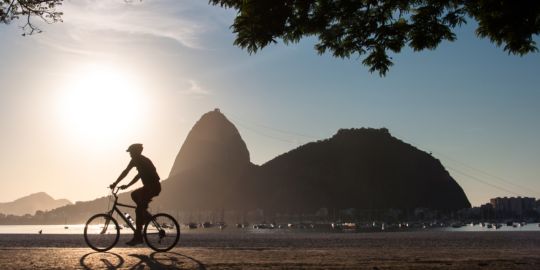Hello,
Studying in a foreign country is an exciting prospect, but at times students do not have enough information to make an informed decision. We invite you to share your own experiences about studying abroad in Brazil.
What are the advantages of studying in Brazil? What are the disadvantages?
Are there proper housing options for students, or do most students have to find their own accommodation?
Are living costs for students in Brazil expensive? What is an average budget for a student per month, including rent, groceries, and social activities?
Is it easy to form a social circle in Brazil? What are some of the preferred social activities?
Are there international student societies or community engagement programs for international students?
Thank you for sharing your experience.
Priscilla
Student life in Brazil
It depends entirely on what city you choose to live and attend school. Cost varies, I would say, the smaller towns and out of main hubs, you will spend less on discretionary expenses such as housing, food, entertainment.
I am using São Paulo as a template, since it provides abundant options on Higher Learning Institutions....
Universities
Avoid living on USP main campus or vicinity. Issues with public safety, in and around Butanta.
Nothing wrong with the school, you might actually use their satelite campus, whether it is Law, Medicine.
There is a large concentration of for profit ( read diploma mills and some reputable universities ) around Vila Mariana, Liberdade
, Bela Vista, around Av. Paulista. And then Barra Funda, Mooca. Since I am not to judge academic proeficiency, then it is up to
you to make such distinctions.
The reason I mention these areas is that , in all likelyhood, unless you are looking for a very specialized subject ( Agriculture in Piracicaba, or UNICamp for Life Sciences and Information Technology, or Maua, FEI , and ITA, for Engineering ), you are more than likely to be situated in São Paulo central areas.
Using São Paulo Central areas as a template....
Housing
There is virtually no Turnkey Student Housing as you may see Stateside or in the UK. Therefore, you are on your own as far as securing housing. Unless you take on roomates to secure housing, then you are in all likelyhood getting an apartment on your own.
Living in the City's outskirts will not do you any good, so we are talking central locations. That being said, expect to pay anything from R$ 1.5000 up to R$ 5.000,00 from Spartan to Swanky. Standard Lease Terms 12-30 months. You can work around those timelines if you choose a flat, but it goes without saying flats do also attract less than desirable neighbhoors ( i.e. pros hosting clients ).
Food. You will eventually develop the habit to shop for groceries, but the average lunch counter fare can set you up from R$ 15,00 to R$ 40,00 per ticket. You do not have to survive on fast food, or the staple rice/beans/fries/meat course. There are plenty places that offer the buffet with a variety of entrees. Freshness, variety, and a smogasboard of options to your palate.
Coiffure, Hairdresser... It varies, anything from R$ 30,00 to R$ 400,00 per appointment, depending where and how you do.
Transportation. Getting around São Paulo, I would not purchase a car. Insurance, Camera Snaphot Moving Violations you are not aware of,
tricky parking and traffic laws, taxes, cost of fuel, repairs. Ditch the car. Besides, taxicabs are relatively affordable, typícally, within São Paulo proper, a cab fare will set you anywhere from R$ 20,00 to R$ 60,00. Subway tickets allow you to shuffle through several lines and the commuter rail without paying for re-entry, it is a R$ 4,00 per one way ticket.
What to wear
Ditch the mall. If you are an avid bargain hunter and have an eye for fashion, head out towards Bom Retiro, and stroll through Rua José Paulino.
Door to door, a good mile dedicated to women's apparel. Retail and Wholesale. You can score some incredible bargains there.
Night out. I can go from budget ( sit around the water hole for drinks ) or pricey ( night club scene ). We are talking pricey as R$ 200 door cover fee. Some places actually wave that fee on females. If that is your thing, then look out for bargains.
Health Care.
Given the cost of getting insured to be a burden on the budget for the average paulistano, recently one stop shop flat rate clinics have been sprouting up all over. Still, the out of pocket expenses here are extremely competitive if you compare against the rates you are quoted on Cash Stateside. You will be pleasantly surprised. Avoid the Public Health System ( SUS ), which is a joke.
Hot tip. If you consider living right outside of São Paulo, Sã0 Caetano do Sul awards its legal residents, with an outstanding Public Health System. Cities like São Caetano and Santo André have added funding from the local municipalities and non profit institutions.
For most other ailments, those that do not require the assistance of a doctor or nurse, the City has more pharmacies than Dunkin Donuts
has in franchises in New England. So many chains, so many options, I suspect the average paulistano is a hipocondriac.
Studying in Brazil, it's actually really hard for foreign students due to language barrier and lengthy system.
Housing is not complected, if students are looking for part-time job besides studying it's really complicated.
I would like to recommend the students those are looking for post graduation with scholarship to try to study in Brazil.
All the best,
Hi, jdm1971
I live in Manaus, and my husband is a university student, so we should have some useful information for you.
For cost of living, this site will give you a start on comparing your current cost of living with that of Manaus, and other cities in Brazil:
https://www.numbeo.com/cost-of-living/c … ry2=Brazil
I moved here from the Chicago area, and find the cost of living very reasonable.
I'll send some info on universities in a later post. One thing: the language of instruction in Brazilian universities is Portuguese. This often seems to surprise English speakers -- I'm not sure why, since this is a Portuguese-speaking country -- but it does, so let's get that out there, upfront.
jdm1971
There are two public universities in Manaus, one federal and one state.
The federal one is the Universidade Federal do Amazonas (UFAM). They offer a Portuguese as a Foreign Language course for foreigners; you can obtain information about it by sending an email to [email protected] .
The state university is the Universidade do Estado do Amazonas (UEA); it doesn't seem to offer a similar course.
Two international for-profit higher education companies operate reputable colleges in Manaus. Adtalem Global Education (you may be familiar with them as DeVry) operates Faculdade Martha Falcão. and Laureate International Universities operates Uninorte, which claims to be the biggest private university in the city. Those companies should be able to inform you about admission requirements, costs, and course offerings.









